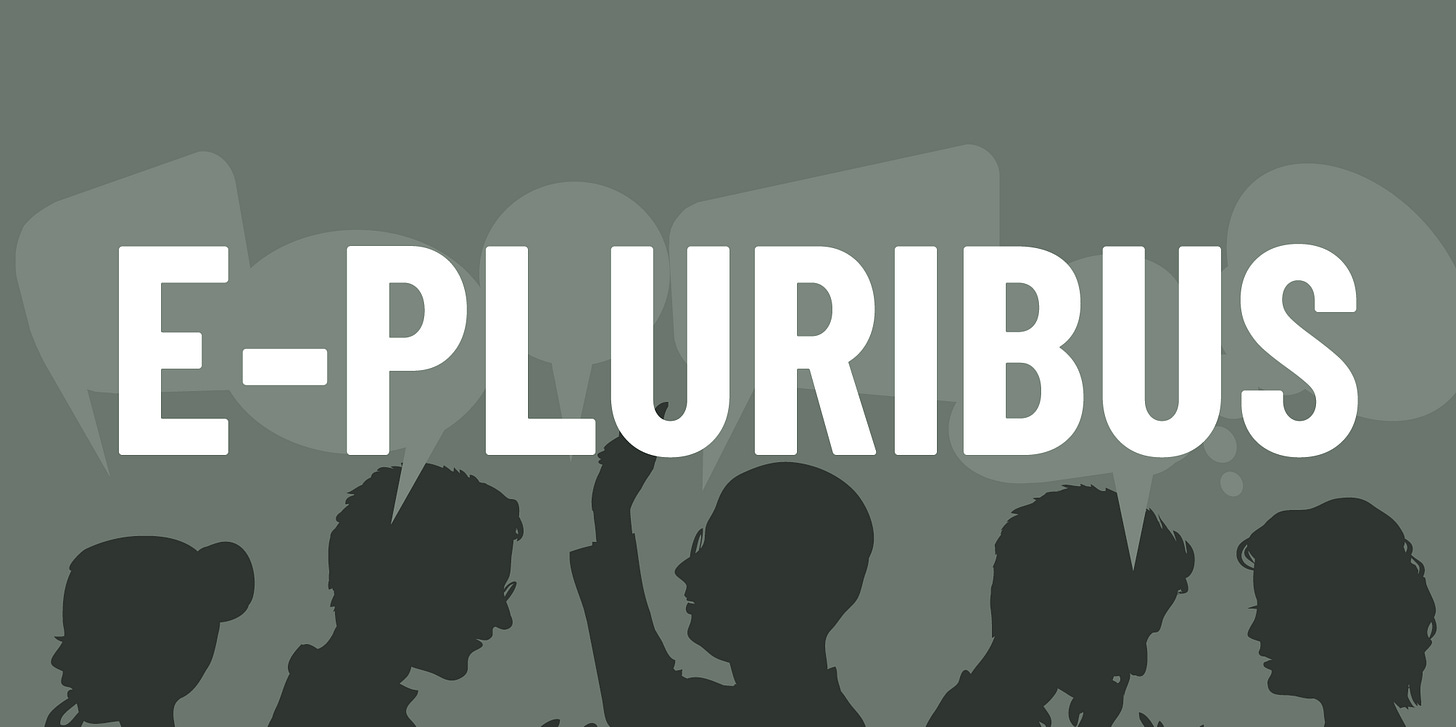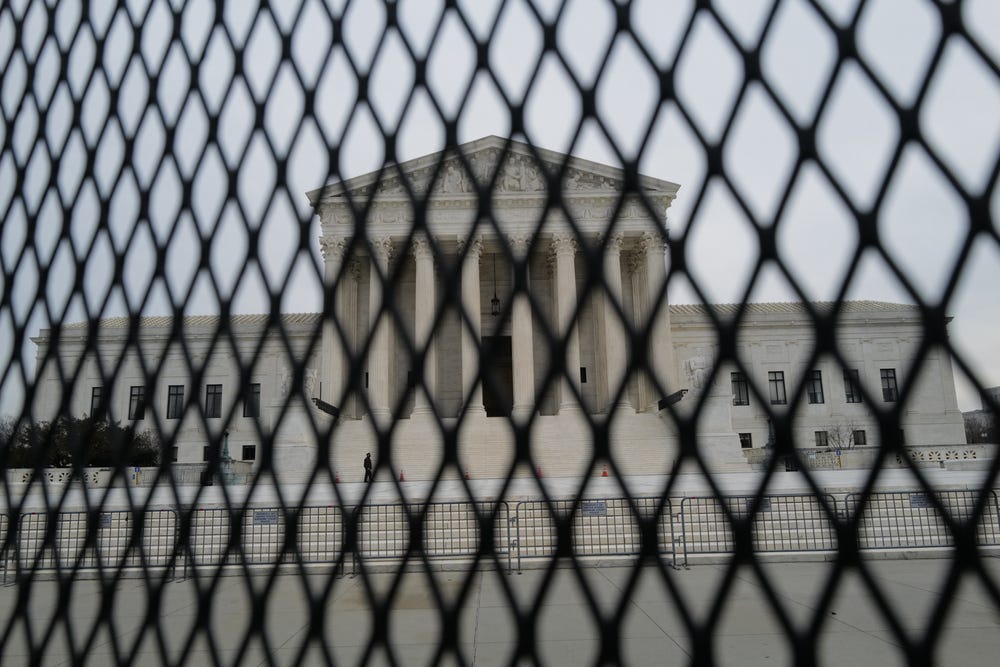E-Pluribus | June 10, 2022
Whatever happened to due process, progressives taking friendly fire, and what the Kavanaugh assassination attempt says about the state of our public discourse.
A round-up of the latest and best writing and musings on the rise of illiberalism in the public discourse:
Robert P. George: Free Speech and Due Process at Princeton: The Case of Joshua Katz
Princeton professor Robert George is a friend and advisor to his erstwhile colleague Joshua Katz, who was recently let go by Princeton. While limited by ethical considerations given his involvement in the situation, writing at Quillette, George nonetheless draws on the public facts to decry Princeton’s apparent disdain for due process in Katz’s case.
My difference of opinion with top university officials does not concern free speech. It concerns due process. These officials, as I understand their position, believe that because the specific allegation made by the woman was new, investigating it, prosecuting it, and punishing Professor Katz on this basis did not amount to trying someone twice for the same offense. For the reasons indicated, I disagree (even if what we are talking about here is a university disciplinary proceeding, to which the constitutional prohibition on double jeopardy in criminal cases does not apply).
Having said that, however, it must be added that the second investigation would not have been initiated if it hadn’t been for student journalists and others with a vendetta against Professor Katz, and who were seeking to dig up dirt on him because they disliked his expressed views. This element really makes the whole business a terrible injustice as well as a personal tragedy—as well as drawing in the issue of free speech, albeit in an indirect and complicated way.
[ . . . ]
There was also a separate scandal that arose from the manner by which (as yet still unidentified) university bureaucrats smeared Professor Katz as a racist through a freshman training program called “To Be Known and Heard: Systemic Racism and Princeton University”—even going so far as to bowdlerize a quotation from him as a means to support this defamation. Specifically, the words “including the many black students” were removed from the aforementioned quotation, “a small local terrorist organization that made life miserable for the students (including the many black students) who did not agree with its members’ demands.” The document also contained statements from detractors, such as “[Katz] seems not to regard people like me [a Black professor] as essential features, or persons, of Princeton,” with no opportunity for Katz or anyone supporting him to reply.
Read it all here.
Seth Moskowitz: Why Democrats Are Recalling Their Own
At Persuasion, Seth Moskowitz makes the case, using San Francisco as his example, that kitchen table issues often trump partisan considerations and ideology in voters’ minds. Politicians who get caught up in the latest online narratives can miss the everyday concerns of John Q. Public and pay the price at the voting booth.
We should be careful about drawing sweeping generalizations from any single election. But we should also not dismiss yesterday’s election as an isolated defeat for the left. It’s the next chapter in a story that’s been unfolding in San Francisco, one which reveals what happens when progressive politicians enact radical reforms, when voters see those reforms making their everyday lives worse, and when politicians refuse to take these concerns seriously.
[ . . . ]
If Boudin’s downfall feels familiar, there’s a good reason for that. Back in February, San Franciscans recalled another crop of elected officials for similar reasons. Then, however, it was three school board members at the center of controversy.
[ . . . ]
The thing to understand about the school board recall—the thing that makes it so similar to yesterday’s—is that it was fueled by voters who saw their everyday lives getting worse. Parents could see their children struggling with their schoolwork and mental health; they had to change their work schedules or find child care; they felt the family tension that comes with a perpetually full house. And all the while, the school board was debating if Abraham Lincoln was sufficiently anti-racist.
What was once seen as a long-shot effort quickly came to pass as life for parents deteriorated and the school board continued to radiate moralism and condescension. By election day, voters were fed up and recalled them with overwhelming majorities.
Read the whole thing.
Ruth Marcus: The Kavanaugh threat exposed weaknesses in judicial security — and our discourse
Ruth Marcus of the Washington Post is no Brett Kavanaugh fan, but in her latest column, Marcus says the attempted assassination of the justice should give everyone pause. Straight lines can rarely be clearly drawn from overheated rhetoric to attempted acts of violence by individuals, yet words are powerful and the potential impact of extreme statements on disturbed minds should not be lightly brushed aside.
If the Supreme Court police require more authority or funding to adequately protect the justices, they should have it; the same holds for the U.S. Marshals Service, which provides security for lower-court judges. If more steps are needed to shield personal information about judges or justices, such as their home addresses, that should be done as well.
That’s the easy part.
The harder part is grappling seriously with the implications of this episode, which could have ended in unfathomable tragedy. That means not ducking responsibility for helping to create a climate of unhinged intolerance that may have fueled this dangerous moment. But it also means not leaping to assign blame or hijack the episode to reinforce preexisting conclusions. Deranged individuals do deranged things, and this is true at both ends of the political spectrum.
[ . . . ]
Somehow those who complain of rhetorical excess on one side are loath to hold those with whom they agree to the same standards. Indeed, Schumer’s language was oddly reminiscent of Kavanaugh’s angry screed against Democrats at his confirmation hearings: “You sowed the wind, the country will reap the whirlwind.” Those who blasted Kavanaugh cannot credibly excuse Schumer, but also vice versa.
Read it all.
Around Twitter
Jesse Singal with a thread on the continuing phenomenon of “feeling unsafe” because of someone’s words or opinions:
A thread from Shadi Hamid on the importance of “first principles” in left/right discourse:
The left had its “isolated incident of violence” during the post-George Floyd riots; now some on the right (Tucker Carlson) are calling January 6th "a forgetably minor outbreak [of mob violence], by recent standards[.]" Let’s go to the video:
And finally, presented without comment, a report (as yet unconfirmed) on Donald Trump’s Truth Social and the January 6th hearings:










